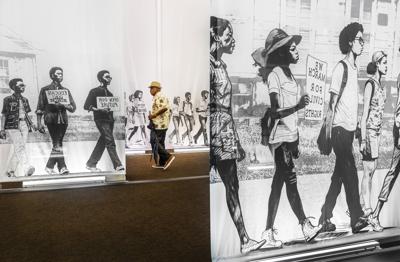The civil rights era was a movement, not a single day, month or year.
It included a number of well-known events, demonstrations and protests such as the 1965 March on Washington for Jobs and Freedom that attracted more than 200,000 participants.
It also included local events such as the New Orleans march on City Hall that brought out some 10,000 people and a march from Bogalusa to the Louisiana State Capitol.
People — all kinds of people — wanted to see things change.
Bit by bit, some things changed across the nation, including here in Louisiana.
In fact, it is often said that Louisiana played a major role in the national civil rights movement throughout our nation's history.
Nevertheless, as the civil rights era has been formally recognized with museums across the United States, Louisiana hasn’t had its own civil rights museum — until now.
During a Monday afternoon event, the Louisiana Civil Rights Museum was officially announced as "The Inaugural Experience." It's located, appropriately, in the Ernest N. Morial Convention Center in New Orleans, and it will open for free public admission for three hours Oct. 8 and again from 9 a.m.-4:30 p.m. Oct. 9-15.
The late Ernest "Dutch" Morial was a leading civil rights attorney and activist in Louisiana and later served as New Orleans' first Black mayor from 1978-86.
“We shouldn’t have to leave to go to other states to learn about our legacy,” Brenda Williams told a group gathered to officially announce the museum’s opening. The convention center is a good temporary location. It needs a permanent location, building and more.
Williams and the Louisiana Civil Rights Museum Advisory Board — a group of volunteers — have pushed to get a civil rights museum in our state since 2008.
Georgia has the National Center for Civil and Human Rights in Atlanta. Alabama has the Birmingham Civil Rights Institute. Tennessee has the National Civil Rights Museum in Memphis. Mississippi has the Mississippi Civil Rights Museum in Jackson.
I've been to each of these and other civil rights museums.
Each provides visitors something different. Each has local civil rights history. Each has a voice unlike the others.
Each also has something ours doesn't have — sustainable funding.
It cost $2 million to get this museum without artifacts opened. The most successful civil rights museums invested millions to build a permanent infrastructure, create state-of-the-art and interactive exhibits, hire a staff to curate and manage the facilities and, most important, build an endowment to ensure strong futures.
To polish this new gem and make it something special, it will take ideas that distinguish it from the others, leaders and volunteers who can raise money to make the introductory museum something permanent, and energy like that of Brenda Williams.
It's been difficult for Williams and a core group of five to keep things going. Theirs is an advisory board, not one of the governor's boards and commissions that get state resources such as per diems or trip allowances. That's made it tough for her board to keep people involved, especially those who traveled from other parts of the state. Williams said they didn't want an all-New Orleans board, so the travel challenges caused the board to meet inconsistently.
Lt. Gov. Billy Nungesser has said the board needs to be restructured. That was a diplomatic way to put.
Williams was blunt: It needs to be replaced. "We have no power."
Nungesser envisions a statewide museum board, including separate entities for the Baton Rouge, New Orleans and Shreveport areas. A civil rights museum group might be a part of one of those boards, or it might have its own board.
Williams doesn't care how it happens; she just wants to see the work done. She helped get the museum to this point, and she's okay with either continuing the work or handing it off to others.
Williams also is realistic about the museum's chances. She isn't asking the state Legislature to fully fund it. She wants private as well as public support.
"We can't simply depend on the state for this," she said at the Monday program.
Williams' vision is something each Louisiana gubernatorial candidate should embrace. I ask: "In your administration, what's the future for the Louisiana Civil Rights Museum, and how will you make it permanent?"
Williams' dream should be the next governor's dream.


















